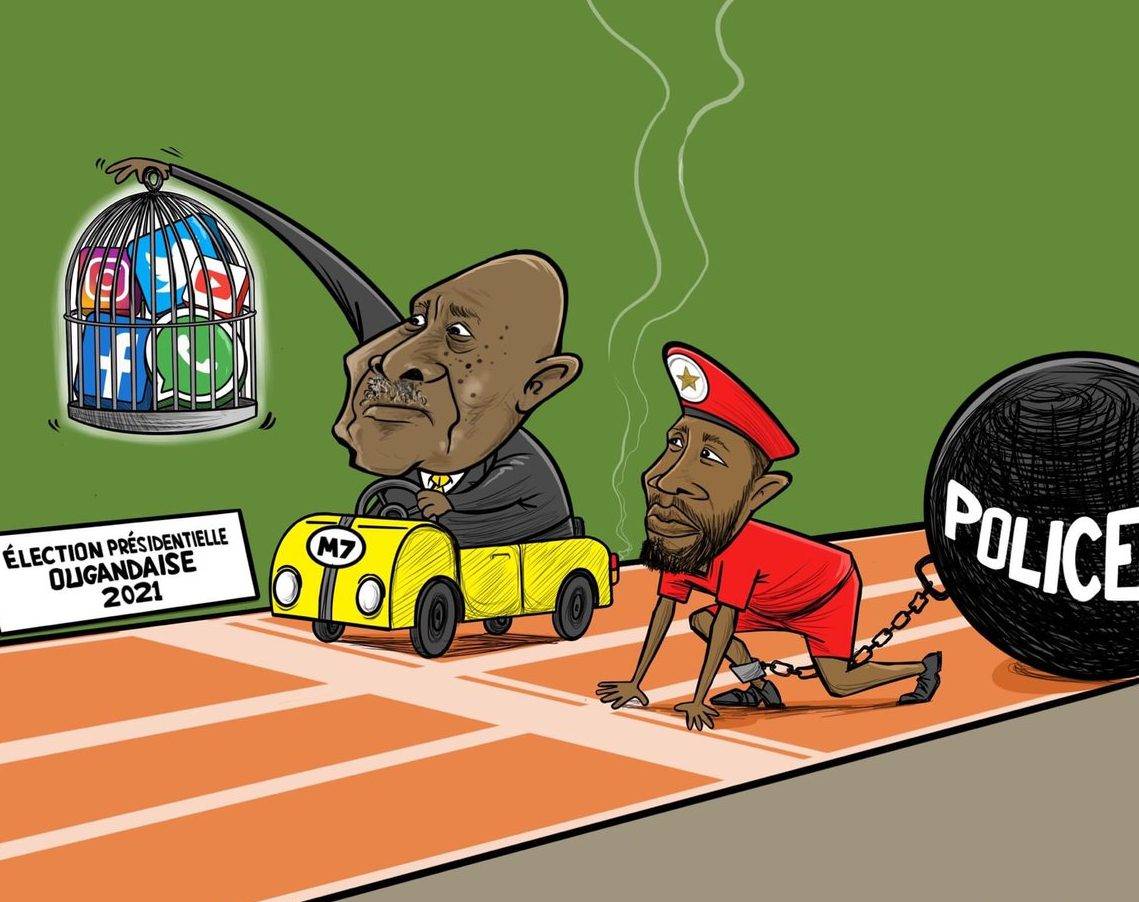Gagged & Blindfolded: How An Internet Blackout Marred Uganda’s Election

Uganda’s most hotly contested election in years happened on Thursday, January 14. And it was no surprise that by the early hours of Sunday, January 17, it was announced that the 76-year-old President Yoweri Museveni, had got himself a sixth term in a landslide.
Indeed, what would have been a big surprise is if the 38-year-old Robert Kyagulanyi (AKA Bobi Wine), somehow managed to snatch victory despite the machinations of repression, oppression, violence, intimidation, persecution, and suppression that stifled the opposition in the build-up to and during the election.
And perhaps the most devious of all those machinations happened on the eve of election day. That was the day the sitting government ordered a nationwide internet shut down.
Many observers have expressed fears of a state-backed ploy to prevent transparency during the polls. On Wednesday night, internet access was cut off for most users in the East African country, though some have used VPNs to communicate online.
MTN Uganda Ltd. said it received a directive from the Uganda Communications Commission (UCC) to suspend all internet gateways and associated access points from 7 p.m. on Wednesday.
“MTN Uganda in compliance with its national telecommunication operator license, and in accordance to MTN’s group-wide digital human-rights due-diligence framework, has implemented the directive,” spokeswoman Rhona Arinaitwe said in a statement.
On the same day the elections kicked off, NetBlocks, which tracks internet disruptions globally, stated; “It’s now election day in Uganda, where some of the last remaining internet service providers are going offline as the country prepares to vote; network data show national connectivity at just 18 percent of ordinary levels; incident ongoing.”
Apparently, it didn’t stop at cutting off the internet. It’s been reported that phone calls were also made impossible in some instances.
On election day, the main opposition leader, Bobi Wine, did report the following:
Like my wife’s, my phone has been blocked and I am unable to receive or make regular calls. I know this is to stop me from communicating with our agents and coordinators. I encourage you, comrades, to be vigilant as I try to devise ways of reaching out to you.”
Bobi Wine also mentioned that his home had been surrounded by security forces who have a mission to keep him under house arrest and to prevent anyone from accessing his home.
On the Wednesday before election day, the US and EU said they would not observe the elections after several officials were denied accreditation. Aside from an African Union mission (under the Africa Elections Watch coalition), which claimed they had observed irregularities, no major international group monitored the vote.
Singer-turned-politician, Bobi Wine, swapped the studio for parliament in 2017 after scoring a landslide victory in the Kyadondo County East constituency by-election.
Before then, he had amassed a measure of fame by using his music to speak up against the socio-economic ills in Uganda. And since then, he has garnered massive support to become the face of the opposition.
When he announced his intention to run for the 2021 presidential election in July 2019, the “ghetto president,” as he is popularly called, unleashed a whole new kind of hostile attention from the ruling class who have described him as an “agent backed by foreign entities seeking to destabilize Uganda.”
Bobi Wine, who was most recently arrested in November 2021 (an arrest that sparked a bout of violence that claimed 50+ lives), has been in and out of custody while bidding to unseat a President who is twice his age and on course for four decades in power. It’s a lengthy tenure that many have attributed to devious tactics on the part of a man they now see as a dictator.
Social media and other online media have been instrumental in Bobi Wine’s campaign given the stringent mainstream media censorship in Uganda.
Despite attempts by the government to limit online media usage by introducing internet taxes and strong-arming social media companies, online media has remained vital to strengthening dissent and the opposition movement in Uganda.
Little wonder the government placed a big, black blanket over the web on election day. This meant communication channels were cut off and real-time updates were impossible. It was the psephological equivalent of gagging and blindfolding.
As a matter of fact, the report as of this moment is that the internet is still out in Uganda. A government minister told the BBC on Saturday evening that the internet service would be restored “very soon”. But the damage may have already been done.
Museveni has described Thursday’s election as the “most cheating-free” in the history of the African nation, but there are many who would beg to differ. Bobi Wine and other opposition candidates maintain that the just-concluded polls were not credible, alleging incidents of vote-rigging and voter intimidation.
Additionally, election observers have stated that confidence in the count had been damaged by the days-long internet outage. As reported by The Guardian, Peter Mwesigye, Director of the Africa Media Centre of Excellence, said it would take time to determine the extent of voter fraud and violence at the polls.
“We know definitely there have been credible reports of fraud, but it’s going to be much harder and it will take many more days for us to begin to get the sense and scope of it,” he said.
“The shutdown of the internet robbed the process of transparency that is required of an election. It has basically been an environment that doesn’t qualify for one to call it a free and fair election.”
Similarly, Bloomberg quotes Godber Tumushabe, an associate director at the Kampala-based Great Lakes Institute of Strategic Studies, as saying; “The internet blackout means there is an absolute lack of transparency.”
In any case, Bobi Wine has stated that he will be “happy to share the videos of all the fraud and irregularities as soon as the internet is restored.”
Featured Image Courtesy: DW